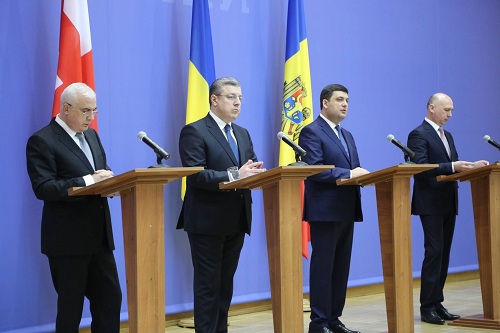
Leaders Pledge to Reanimate GUAM

GUAM Prime Ministers Press Conference, Kyiv, March 27, 2017. Photo: Government Administration
During his visit to Ukraine on March 27 Prime Minister Giorgi Kvirikashvili took part in GUAM summit alongside Ukrainian Prime Minister Volodymyr Groysman, Moldovan Prime Minister Pavel Filip and Deputy Prime Minister of Azerbaijan Ismat Abbasov.
At the summit, the four countries signed two protocols for enhancing cooperation within GUAM’s Free Trade Area agreement of 2002. The first document regulates the procedure for establishing and operating the working body for coordinating the agreement-related activities and the second one harmonizes the customs control procedures of goods and transport means moving across the state borders of GUAM member states.
"We can say that today new life has been breathed into GUAM, and we are all very optimistic about the organization’s future," Giorgi Kvirikashvili noted at the joint press conference of four leaders on March 27.
“Today is an important occasion. We held a significant summit and signed [two] documents that will allow us to improve cooperation between our countries. We are speeding up the introduction of a Free Trade Area within GUAM member states and we will analyze the options regarding the improvement of our transport logistics,” Volodymyr Groysman stressed in his opening statement at the business forum, which was also held as part of the summit. “The potential of our countries will enable us to achieve more. We will make every effort to fill this format with new energy. We are opening a new page in the history of GUAM,” he added.
The parties also focused on the prospects of integrating the four counties’ transport infrastructure within the New Silk Road project. “Transport link, transport corridors connecting our countries possess a special strategic significance,” Prime Minister Groysman said at the joint press conference. “When we are capable to build efficient transport links – railway networks, roads, and ports – we will improve the quality of our interaction,” he added.
“The geographic locations of our countries enables us to increase the competitiveness of GUAM Transport Corridor. In this context, we must pay special attention to multiplying our joint efforts to implement the concept of the GUAM Transport Corridor,” Prime Minister Kvirikashvili stated in his remarks at the ministerial meeting .
The parties also touched upon the issue of unresolved conflicts. PM Kvirikashvili said at the ministerial meeting that "today’s global and regional challenges obligate us to cement our interactions within GUAM and in the international arena. Territorial integrity remains one of the most painful problems and a common challenge facing the GUAM member states. The unsolved conflicts in the GUAM region impede our countries’ political, economic, and social development. The voice of GUAM in this regard must be as loud as possible."
“Importantly, we must be more active in using GUAM’s potential for attracting international support and adequate reaction to violations of the territorial integrity of the organization’s member states,” he added.
Unresolved conflicts featured in the joint statement as well.
“We reaffirm our desire for an immediate settlement of the ongoing conflicts in the territories of GUAM member states based on sovereignty, territorial integrity and inviolability of the internationally recognized borders of states, considering that the territory of a state cannot be captured by another state as a result of the threat or use of force and that no territorial encroachment, military occupation or annexation as a result of such actions should be recognized as legitimate,” the statement reads.
GUAM – Organization for Democracy and Economic Development – unites Azerbaijan, Georgia, Moldova and Ukraine. This regional body was established in 1997 largely to oppose Russia’s military and political influence and to shape a joint block within the Commonwealth of Independent States (CIS). Its members are mostly preoccupied with “frozen conflicts”, and joint economic projects that link the members to the European markets, bypassing Russia. Its vitality has largely depended on the degree of collaboration of the respective leaderships with Moscow, and was thus varying considerably, especially in cases of Ukraine and Moldova. The organization was last active in 2008.
This post is also available in: ქართული Русский